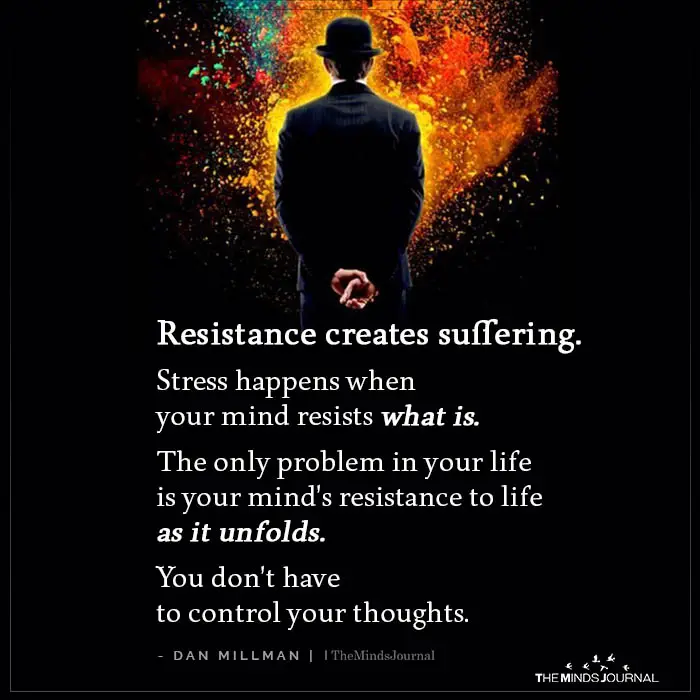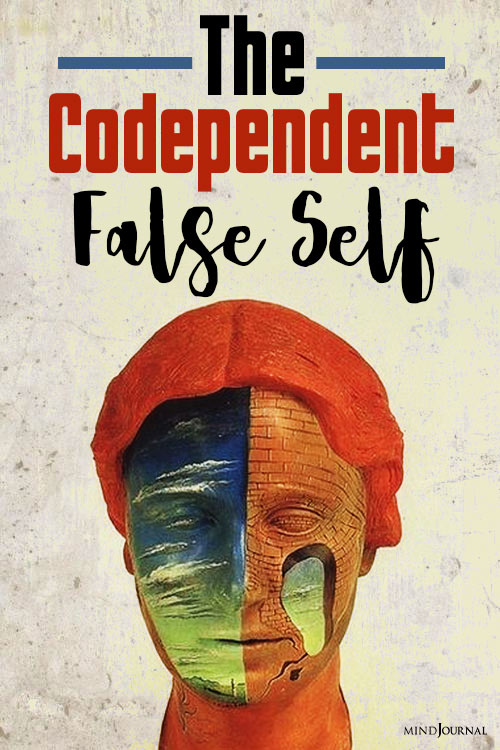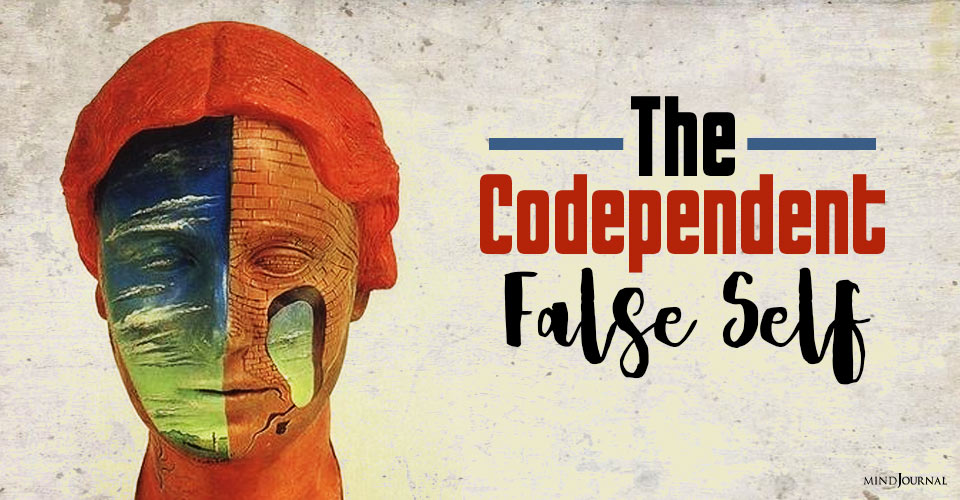The false self is an artificial personality we create to protect our actual true self. Individuals with a strong stipulation for validation or approval adopt false self-presentation. Developing a false self can be quite soothing as it somehow hides our psychological wounds, but in turn, it also takes away our ability to deal with the challenges that are the non-negligible parts of everyone’s lives.
Codependents don’t realize that they’re living from their false self. Because the false self isn’t real, you might feel anxious trying to be accepted by others or believe that they can see through you or are judging you.
There’s an immediacy and aliveness in living authentically. It requires presence. Hence, depression and feeling disconnected are signs that you may be estranged from your true self, which can be reversed by discovering what you really need and want and then acting to get it. The false self may also manifest as the façade of the pompous narcissist, the brazen or rebellious addict, and the codependent good boy or nice girl.
Most people function from their codependent false self. It has kept them safe, starting in childhood, and for some people, in infancy. The goal of codependency recovery is to uncover and embody our true, authentic selves. At first, people are usually baffled wondering what that means and how to go about finding and reconnecting to their true self.
Read: Unmasking The Ego: How To Take Off The Mask and Be Your True Self
Signs of the false self might be:
- Emotional numbness
- Feelings of inadequacy, shame, or low self-esteem
- Anxiety with other people
- Editing your words
- Dissociation – watching yourself
- Often feeling empty, dead, flat
- Imagined superiority
- Trouble regulating emotions
- Trouble connecting to others
- Fear of intimacy
- Imposter syndrome
- Depression, lack of motivation
English psychoanalyst and child psychiatrist Donald Winnicott first developed the concept of a false self (also referred to as our persona in Codependency for Dummies). It’s formed as an adaptive, learned, defense to the true self. Behind the false persona, people may experience emptiness, but most of the time, they keep distracted from ever feeling that, except, perhaps, when alone.

Addictions, busyness, and focusing on other people are all ways to avoid it. Some people will accumulate worries, annoyances, and conflicts so that their life is filled with reactions to problems.
The False Self in Childhood
In early childhood due to faulty parenting, we learn to accommodate our caretaker, rather than express our natural and instinctual selves. This may be compounded with feelings of shame due to trauma and emotional abandonment. One example of dysfunctional parenting is when a child of a narcissistic mother withholds anger and the expression of needs not to upset or require anything that might burden her.
This defensive maneuver protects the child from being abandoned and the mother from the child’s anger and disappointment. Far too young for healthy development, some children learn to play quietly, not cry and realize that they have only themselves to rely on.
One client developed inflated ideas about her abilities and invulnerability, believing that she could handle anything, while at the same time feeling helpless and incompetent, just as she had as a child.
Psychoanalyst Melanie Klein proposed that a child must be able to bite the mother’s breast,” meaning that the mother must continue to love and nurture a child in spite of the child’s anger. Similarly, Winnicott believed that true autonomy and self-differentiation are possible only when aggression can be expressed within a relationship and the other can survive it.
The False Self in Adulthood
Later in life, many codependents live from an accommodating false self and/or appear to be self-sufficient. They become a pleaser and focus on meeting the needs of other people rather than responding to and from their inner, true selves.
In relationships with addicts, abusers, or people with personality disorders, they meet their partner’s needs hoping that their needs will be filled in return, which never happens. However, due to trauma bonding, compliance can become a duty, although codependents get addicted to relentlessly trying.
Read: What Is Trauma Bonding and How It Keeps You Stuck In Abusive Relationships
When we learn to follow directions to stay safe, our creativity and independence can get stifled because we steer clear of doing things alone or trying something original that could be met with disapproval. We don’t want to make waves and go along to get along. At work, we might fear taking risks and sometimes avoid taking on new responsibilities.

A blatant example is imposter syndrome when we feel we don’t measure up to the responsibilities expected of us at work. Imposter syndrome can also occur in intimate relationships when we fear our partner will see who we really are. The false self blocks the aliveness of real intimacy and leads to emotional unavailability in order to feel safe. We’re actually emotionally unavailable to ourselves.
Winnicott realized that a false self is necessary for some situations to fit into society. This is where shame has its proper place. We don’t defecate in public or talk on our cell phones in church. Despite this, a person with a healthy personality is able to connect to others and express his or her true self in appropriate circumstances.
Giving Up the False Self
Giving up a false self often involves facing one’s vulnerability, fears of dependency, and the loss of the illusion of self-sufficiency. On the bright side, this allows us the opportunity to receive love and get our needs met.
In good psychotherapy where you feel safe, you can escape having to hide behind a fake persona. A trusted, skilled therapist affords you the opportunity to express your true self, thereby helping you to experience a new sense of aliveness that should have been there from the start.
Uncovering your feelings, honoring them, confronting your shame, and practicing being authentic in twelve-step meetings, in therapy, and with trusted friends are steps you can take to loosen the strait-jacket that the false self imposes. Do the exercises in Conquering Shame and Codependency: 8 Steps to Freeing the True You
© 2022 Darlene Lancer
Written By: Darlene Lancer JD LMFT
Originally Appeared On: Codependency
Frequently Asked Questions
Can a man be so scared to love that he distances himself from his love interest?
It can be possible for a man who is afraid of intimacy or commitment, or who has been through some adverse experiences regarding love to be avoidant of a new love interest.
What should be some life goals for a woman who is negative about life and has low self-esteem?
She must be aware of her strength and weakness, work on her defense mechanism, try to gain more insights about life and people’s nature, and formulate healthy coping techniques.
What do self-confidence and self-control have in common?
Self-confident people are sure that they can manage their emotions as well as external stressors, so they calmly process any negative feedback and get less tempted to react.









Leave a Reply
You must be logged in to post a comment.